Serving 1,026 students in grades 9-12, Dyer County High School ranks in the top 30% of all schools in Tennessee for overall test scores (math proficiency is top 50%, and reading proficiency is top 50%).
The percentage of students achieving proficiency in math is 33% (which is higher than the Tennessee state average of 31%). The percentage of students achieving proficiency in reading/language arts is 46% (which is higher than the Tennessee state average of 37%).
The student:teacher ratio of 14:1 is lower than the Tennessee state level of 15:1.
Minority enrollment is 17% of the student body (majority Black), which is lower than the Tennessee state average of 43% (majority Black).
Quick Stats (2025)
- Grades: 9-12
- Enrollment: 1,026 students
- Student:Teacher Ratio: 14:1
- Minority Enrollment: 17%
- Graduation Rate: 97% (Top 5% in TN)
- Overall Testing Rank: Top 30%
- Math Proficiency: 33% (Top 50%)
- Reading Proficiency: 46% (Top 30%)
- Science Proficiency: 64% (Top 10%)
- Source: National Center for Education Statistics (NCES), TN Dept. of Education
Top Rankings
Dyer County High School ranks among the top 20% of public schools in Tennessee for:
Category
Attribute
Science Proficiency
Graduation Rate
School Overview
Dyer County High School's student population of 1,026 students has declined by 11% over five school years.
The teacher population of 72 teachers has grown by 10% over five school years.
Grades Offered
Grades 9-12
Total Students
1,026 students
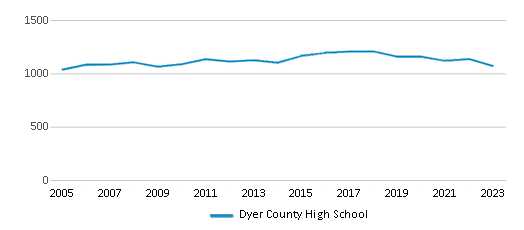
Gender %
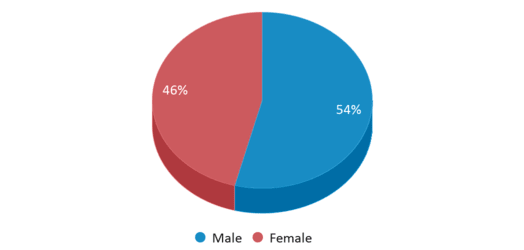
Total Classroom Teachers
72 teachers
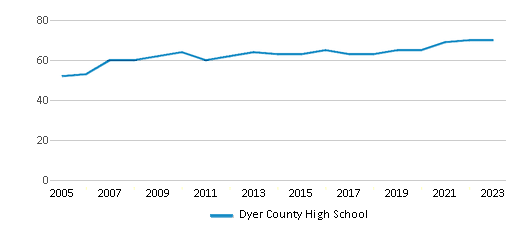
Students by Grade
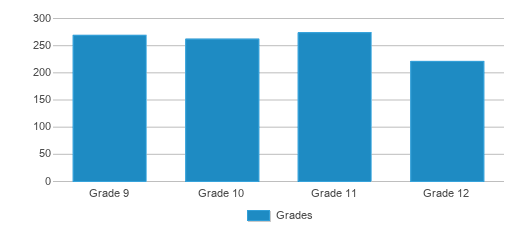
School Rankings
Dyer County High School ranks within the top 30% of all 1,761 schools in Tennessee (based off of combined math and reading proficiency testing data).
The diversity score of Dyer County High School is 0.30, which is less than the diversity score at state average of 0.61. The school's diversity has stayed relatively flat over five school years.
Overall Testing Rank
#523 out of 1761 schools
(Top 30%)
(Top 30%)
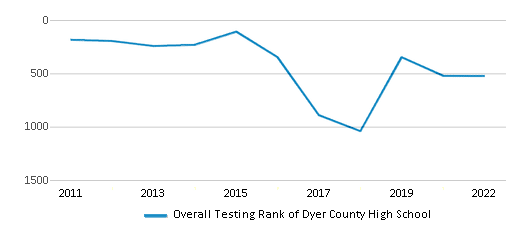
Math Test Scores (% Proficient)
33%
31%
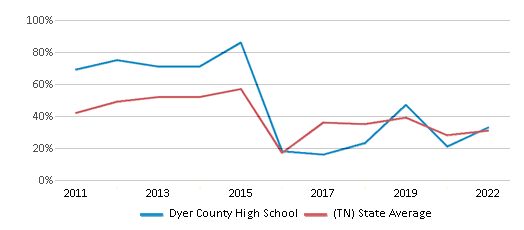
Reading/Language Arts Test Scores (% Proficient)
46%
37%
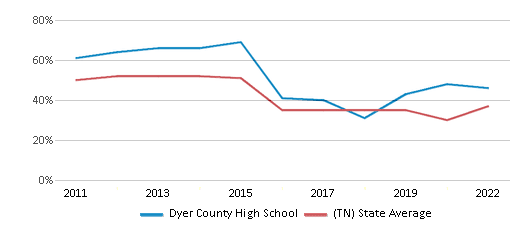
Science Test Scores (% Proficient)
64%
40%
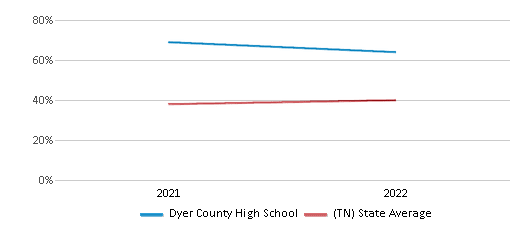
Student : Teacher Ratio
14:1
15:1
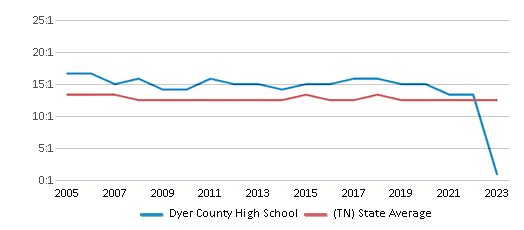
American Indian
n/a
n/a
Asian
n/a
2%
Hispanic
6%
15%
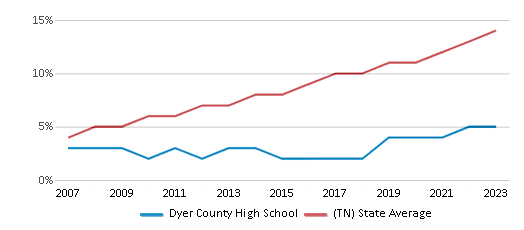
Black
7%
21%
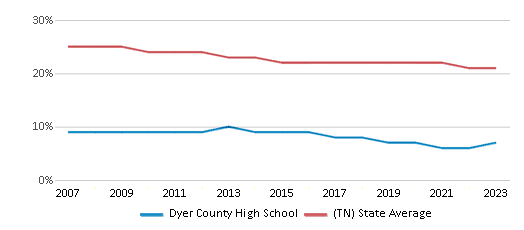
White
83%
57%
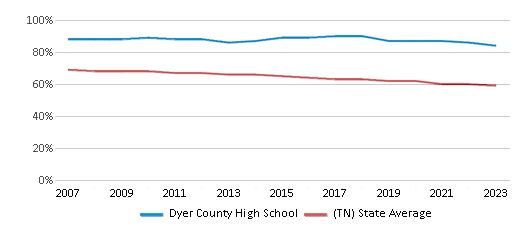
Hawaiian
n/a
n/a
Two or more races
4%
5%
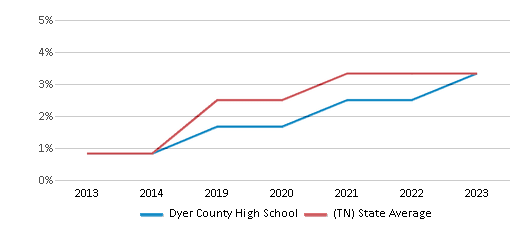
All Ethnic Groups
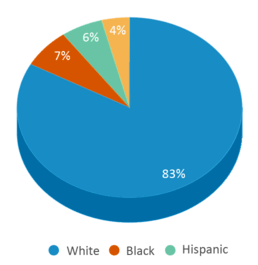
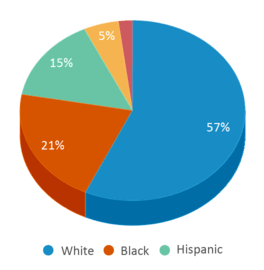
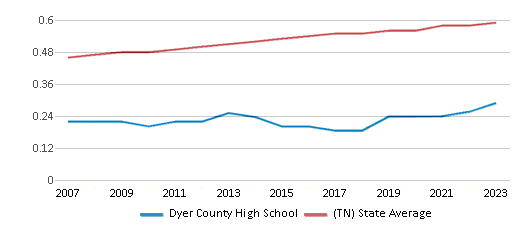
Graduation Rate
97%
90%
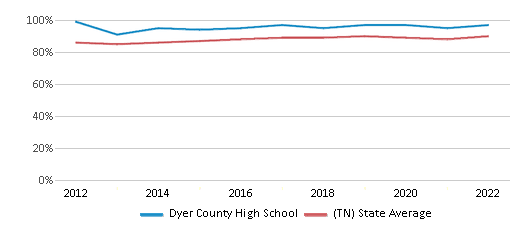
Participates in the National School Lunch Program (NSLP)
Yes
Eligible for Free Lunch
52%
45%
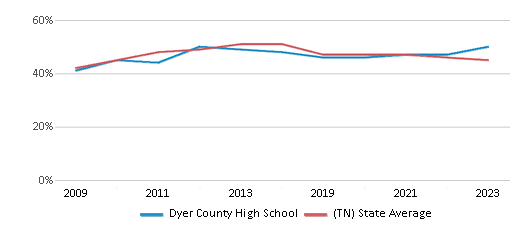
Eligible for Reduced Lunch
10%
6%
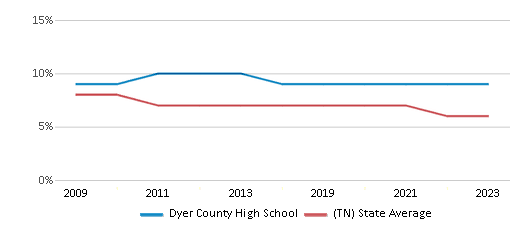
School Statewide Testing
School District Name
Source: National Center for Education Statistics (NCES), TN Dept. of Education
Profile last updated: 02/09/2025
Frequently Asked Questions
What is Dyer County High School's ranking?
Dyer County High School is ranked #523 out of 1,761 schools, which ranks it among the top 30% of public schools in Tennessee.
What schools are Dyer County High School often compared to?
Dyer County High Schoolis often viewed alongside schools like Dyersburg High School by visitors of our site.
What percent of students have achieved state testing proficiency in math and reading?
33% of students have achieved math proficiency (compared to the 31% TN state average), while 46% of students have achieved reading proficiency (compared to the 37% TN state average).
What is the graduation rate of Dyer County High School?
The graduation rate of Dyer County High School is 97%, which is higher than the Tennessee state average of 90%.
How many students attend Dyer County High School?
1,026 students attend Dyer County High School.
What is the racial composition of the student body?
83% of Dyer County High School students are White, 7% of students are Black, 6% of students are Hispanic, and 4% of students are Two or more races.
What is the student:teacher ratio of Dyer County High School?
Dyer County High School has a student ration of 14:1, which is lower than the Tennessee state average of 15:1.
What grades does Dyer County High School offer ?
Dyer County High School offers enrollment in grades 9-12
What school district is Dyer County High School part of?
Dyer County High School is part of Dyer County School District.
School Reviews
5 10/12/2020
Great school and many opportunities in just a small town!
2 5/17/2016
As a current student involved with many different programs offered at Dyer County, I would not recommend the school. Although the academic programs a superb, there is an "unequal" balance between extracurricular activities and favoritism among students. While most teachers are fair and balanced, there are still some who are there for there paycheck and not to help the students. There is a wide variety of extracurricular activities, but they are not supported equally. Football, Basketball, and Baseball get 90% of the support and the rest recieves the tale end. Band, JROTC, and The Arts recieve least. The band has been in desperate need of an assistant director and several instruments that cannot be purchased through the band funding. The constant answer is always, "it's not in the budget", while some how it is in the budget to have 8 football coaches, 5 basketball coaches, and 4 baseball coaches. A student would love this school if they were mainly in to sports, but not if they enjoy the arts. Would I recommend this school: academically, yes; as far as the faculty or balance of extracurricular activities, no.
Review Dyer County High School. Reviews should be a few sentences in length. Please include any comments on:
- Quality of academic programs, teachers, and facilities
- Availability of music, art, sports and other extracurricular activities
Recent Articles

What Is A Charter School?
Explore the world of charter schools in this comprehensive guide. Learn about their history, how they operate, and the pros and cons of this educational innovation. Discover key facts about charter schools, including admission policies, demographics, and funding, as well as what to look for when considering a charter school for your child.

10 Reasons Why High School Sports Benefit Students
Discover the 10 compelling reasons why high school sports are beneficial for students. This comprehensive article explores how athletics enhance academic performance, foster personal growth, and develop crucial life skills. From improved fitness and time management to leadership development and community representation, learn why participating in high school sports can be a game-changer for students' overall success and well-being.

February 05, 2025
Understanding the U.S. Department of Education: Structure, Impact, and EvolutionWe explore how the Department of Education shapes American education, from its cabinet-level leadership to its impact on millions of students, written for general audiences seeking clarity on this vital institution.









